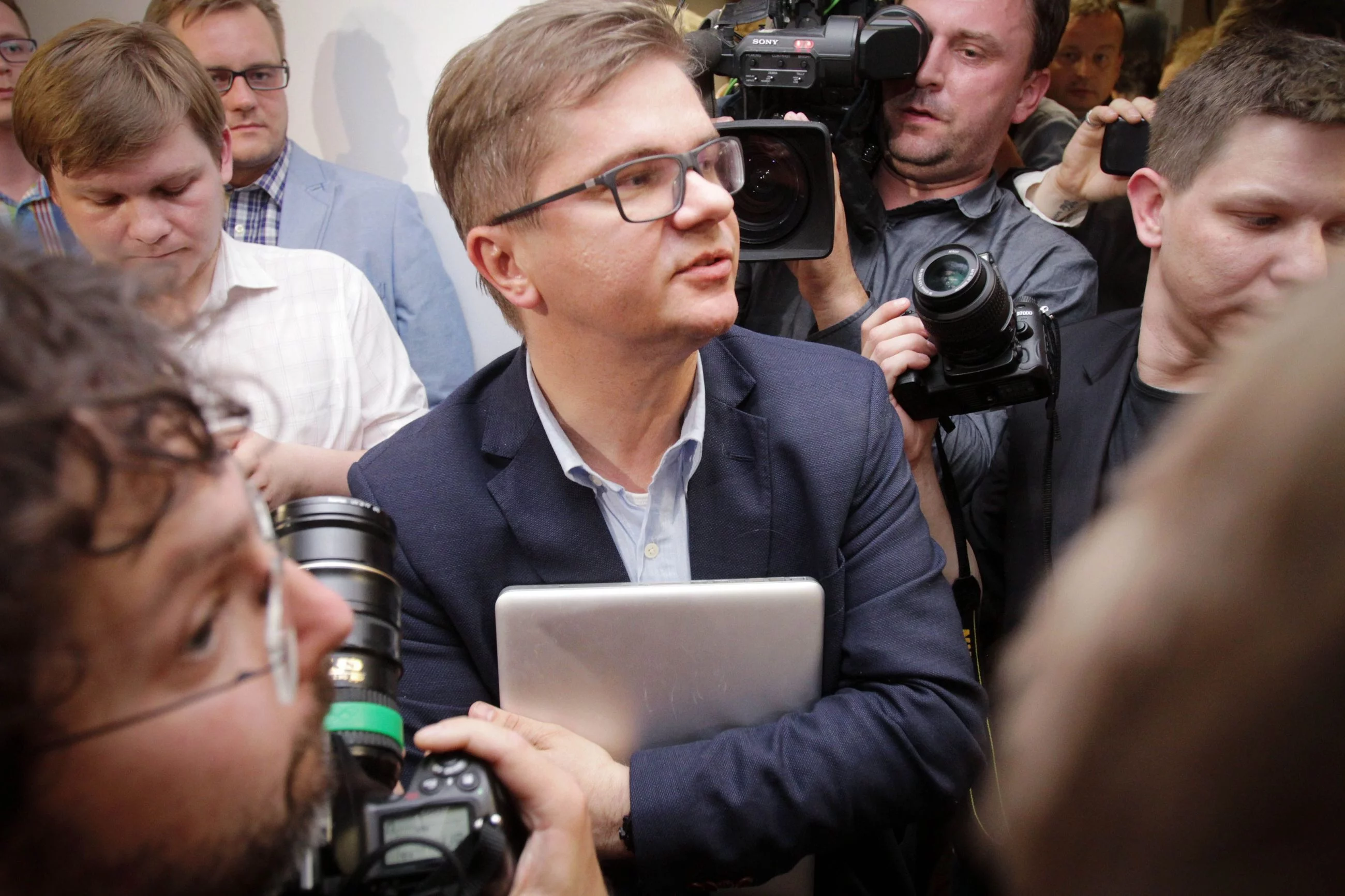Almost 6 years later, and yet I believe I’m right in saying this was the last time where people from such varying worlds said: ‘Stop, this is not the way authorities should treat the media!’. From Monika Olejnik to Cezary Gmyz, from Wojciech Czuchnowski to Samuel Pereira, from Bertold Kittel to Michał Rachoń, from Katarzyna Kolenda-Zaleska to Rafał Ziemkiewicz. Dozens of journalists, full range of editors from Gazeta Wyborcza, Sieć, through Rzeczpospolita, Dziennik, RMF, Radio Zet, to Newsweek, TVN and Wyborcza.
‘This was the first case since 1989 of a blatant power play against the media where the secret service openly interfered with the freedom of speech in its most sensitive aspect – the protection of sources that requested to stay anonymous. (...) We cannot remain indifferent to this brutal act where journalistic autonomy was compromised’, wrote journalists in an open letter in that time. In the times of Poles fighting against Poles, it was uplifting to see there were still basic values people could stand for together: protection of sources, journalistic confidentiality and attitude towards acts of violence by the secret service towards reporters.
Two days ago, the case reached its little finale. When resolving accusations brought by Józef Gacek, the prosecutor who led the operation at “Wprost”, judge Monika Tkaczyk-Turek at the District Court in Warsaw found me guilty and fined me with PLN 18,000 under Article 224(2) of the Polish Penal Code. Let me just add that in the reign of prosecutor Andrzej Seremet and the coalition between the Civic Platform (PO) and the Polish People’s Party (PSL), the investigators conducted relevant proceedings and discontinued them as they had failed to establish any elements of an offense in our actions.
Article 224(2), justifying my sentence on Monday, says that he who uses violence or an illegal threat with the intention of forcing a public official to undertake or abstain from a lawful official duty shall be liable to a penalty. This pertains exactly to the infamous situation where ABW agents intended to take the computer away from Latkowski. In any case, I did not use violence or threats. My alleged behavior did not occur. If there is any doubt, you can see the popular video on YouTube. And to make it clear, the process did not indicate even the slightest sign of me being violent or threatening someone. Not one word was offensive!
Judge Tkaczyk-Turek also assigned similar behavior to the publisher (who also happened to be in Latkowski’s office), fining him with an amount 2,000 higher than mine. No written reasoning has been drafted yet, but the lawyers present at the trial provided me with the orally pronounced ratio decidendi of Monika Tkaczyk-Turek. I find the judgment routine, run-of-the-mill, to some extent sadly puerile, as such key things like wider context and circumstances have not been taken into account.
Firstly, the judge pointed out there was no conflict of interests that evening, as the prosecutor’s decision did not involve disclosure of sources, but only the conversations. And if the person summoned (i.e. Latkowski) had handed over the laptop, it would have not constituted disclosure of journalistic confidentiality. This was definitely not the case, and there was obviously a fundamental conflict of interests! Under the command of prosecutor Gacek, the agents tried to deprive Latkowski of the laptop where he stored records of many journalistic investigations, including such based on contacts he had had with sources that requested to stay anonymous. By blowing the whistle on their sources, a journalist ends their career. They can tear up their license and move on to another profession. And this was exactly the most significant conflict of interests.
Secondly, Monika Tkaczyk-Turek indicated that if it takes hours for prosecutors and ABW agents to explain something to a citizen who still refuses to undertake an action, it means abuse of authority. You could roughly agree, but the situation of June 18, 2014 was much more complex than the judge would like to see it.
To begin with, the prosecutors and ABW agents urged us to surrender the carriers with recordings (which, by the way, at that time were in the public domain). I remember how surprised the ABW commander Grzegorz Czechowicz was when we were telling him we don’t physically dispose of the carriers (CDs, floppy disks, tapes on reels), but only of a Google cloud link where the source had saved the recordings. It felt like they didn’t understand what we are trying to explain nice and easy.
Another thing is, the operation was taking hours from an early afternoon until late night not because of us, but because of the ABW team and the prosecutor’s office. They did not secure the place. Yet, they wanted to search through an open space where at least 200 people had gathered. Interestingly and mysteriously enough, the police remained unconcerned. Apparently they had been instructed by a sane superior not to be in the front line of this grotesque operation carried out by the service and prosecutor at the editorial office.
Last but not least, the investigators did not have an IT specialist who would have easily created a binary copy of Latkowski’s MacBook. The judge also said that no one asked me in to Latkowki’s office where the great commotion took place that afternoon and evening. This is not true. I had been designated for this purpose and my presence had been accepted by the prosecutors. There are more statements in the judgment and its oral reasoning that give rise to even more doubts. Like the one that the crowd in front of Latkowski’s office was aggressive. A lot can be said about this crowd of reporters from various editorial offices, but not that it was aggressive! Chanting “Free media!” and aggression have pretty much nothing in common.
One final remark. I understand there is a heated dispute between certain politicians and judges. But please remember one thing. That behavior, that objection to violence towards a journalist, that basic aspect of protecting sources had nothing to do with politics. Nothing at all. To put it short, I would act the same way if this laptop was being ripped by agents supervised by any other government. Judgments calling ethical, moral behaviors aimed at protecting the rules of free press an offense build neither trust nor faith in justice. I refuse to think that this case can actually end like this. I am hoping for the prudence, reason and imagination of the appeals court.

